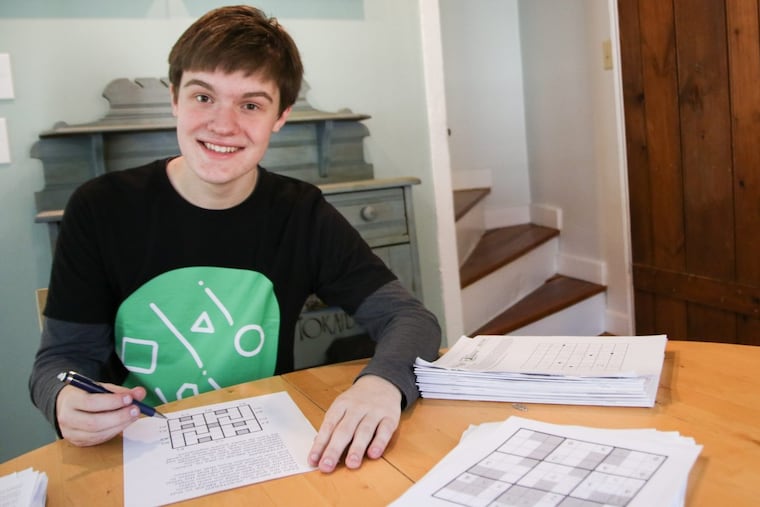Doylestown teen is a world-class puzzle solver
At last month's World Puzzle Championship in Bangalore, Walker Anderson, a junior at Central Bucks West High School, placed seventh out of 169 and first in the under 18 category.

In his field of play, Doylestown teen Walker Anderson has already achieved Olympic-like status at age 16 — ranked one of the world's top 10 in contests from India to Slovakia.
Perhaps the only thing keeping the Central Bucks West High School junior from becoming a household name with big endorsement contracts is the relative obscurity of the world where he excels: as a superstar on the U.S. Puzzle Team.
"I don't think most people know about this," Will Shortz — the New York Times puzzle editor and crossword guru who founded the World Puzzle Championship a quarter-century ago — said with a laugh.
But ever since Walker learned of the contest in the sixth grade, it's been hard for him to think of anything else. Always a precocious math whiz, he took an online course called the Art of Problem Solving offered by a past champ and got hooked on the puzzles, which require the solver to use logic to complete numbers, shapes, or patterns on a grid.
"He'd come home from school each day, and puzzles from around the world were posted on blogs," his mother, Susan Anderson, said. "He couldn't wait to get in the door and start them."
In five short years, puzzle practice has made Walker one of the best solvers on the planet. At last month's World Puzzle Championship in Bangalore, he placed seventh overall (out of 169) and first in the under-18 category, though there were only three other competitors in that age group. More important, he helped the four-member U.S. team to a second-place finish — in a competition where almost all of his rivals were adults or college students.
"He's a brilliant kid, one of the fastest solvers and the best solvers in the world," said Shortz, arguably the world authority on the subject.
The world championship event was created by Shortz in 1992 as a way for solvers from more than 30 nations to compete using puzzles that aren't word-based, eliminating the language barrier. Participants complete some 300 puzzles over three days of competition, with each puzzle timed and assigned points. The best-known variation is the popular number grid Sudoku — printed in many newspapers — which has become so popular that there is a separate championship for it.
"The puzzles are hard; some of them I don't even understand the instructions on — he eats them up," Shortz said of Walker.
A friendly kid with a big smile, Walker was born with a knack for mathematics that has boggled the minds of both his mom, who works in human resources, and his dad, Ken Anderson, an analytical chemist for a pharmaceutical company.
The couple still have a video of Walker from a third-grade talent show, which he won by reciting the first 130 or so digits of pi after handing the judges a printout so they'd know he was getting it right. He won best in show. It has always been like that for Walker, who, as a toddler, wasn't particularly interested in watching Thomas the Tank Engine but was obsessed with letters and numbers.
"I always liked puzzles in general when I was little," recalled Walker. "I did word searches" — when he wasn't showing off with numbers. Walker took the fifth-grade math class when he was in the first grade and the highest-level high school course — Advanced Placement Calculus BC — when he was in seventh grade, the same year he got a perfect score on the SAT math test. He has since enrolled in online college math courses through Johns Hopkins University.
Nick Baxter, longtime captain of the U.S. Puzzle Team, said Walker is the youngest ever to compete for America in the global competition. In 2016, he qualified for the event in Senic, Slovakia, by besting roughly 1,000 others in an online competition, "Usually you don't get someone brand new just showing up, but he did," Baxter marveled.
Walker placed 10th in Slovakia his first year as the U.S. team finished third. And he found it thrilling to be surrounded for three full days by like-minded puzzle solvers, who start strategizing with a sample puzzle hinting at that day's logic over breakfast at 7 a.m. and then compete, both individually and as a team, until 6:30 at night.
"Some people don't finish the puzzles," Walker said. "It's about prioritizing. If you make a mistake, you move on to another one."
Walker's youth hasn't stopped him from teaching what he's learned about puzzles to others, first on his blog — WA1729 — and this summer in his book called A Beginner's Guide to Logic Puzzles, which can be purchased online for $5.99.
Yes, Walker has other hobbies, including playing the cello as well as geocaching, which involves finding objects outdoors based on coordinates, a kind of three-dimensional puzzle-solving out in the fresh air. Meanwhile, he took the SAT again in August and scored a perfect 800 in math — of course — and a 760 in reading and writing; he said he'll take it again because he wants a perfect score and "that would be cool."
That would also match his trajectory in the puzzling world, where it seems the sky is the limit. "I expect good things for the future for Walker, as long as he stays interested," said Baxter, the U.S. team captain. That shouldn't be a problem.
Indeed, Walker already is eyeing Massachusetts Institute of Technology for college, not only for MIT's top-rated programs in subjects such as applied math, but also because it's a mecca for puzzlers, including an annual Puzzle Hunt that attracts the nation's best, which Walker has already attended.
"One of the dorms has a puzzle floor," Walker added. "I would probably end up there."